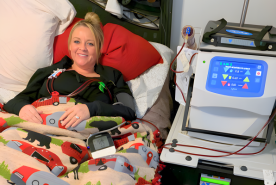Manage heart health on dialysis with a heart-healthy diet, regular exercise, and medical treatments. Control blood pressure, cholesterol, and blood sugar levels.
Heart disease is very common in people with kidney disease or kidney failure. In fact, it is the leading cause of death in people with kidney failure. But there are things you can do to keep your heart and blood vessels healthy. If you already have heart disease? You can take steps to keep it from getting worse.
What is heart disease?
Heart disease describes a number of disorders that can affect the heart or blood vessels. Doctors call these disorders cardiovascular disease. (Cardio means “heart” and vascular means “blood vessels.”)
Your heart and blood vessels work together to bring oxygen to all parts of your body, including your brain, heart, legs, and lungs. Having damage to either your heart or your blood vessels can be very serious. It can lead to chest pain, heart attack, stroke, or even death.
Two common types of heart disease are:
- Heart failure. Heart failure does not mean your heart has stopped pumping. It means your heart cannot pump well enough to move blood and fluids through your body. Heart failure happens slowly over time as the pumping action of the heart grows weaker, or as blood vessels that supply oxygen to the heart become narrow or blocked.
- Coronary Heart Disease. This disease happens if the blood vessels that bring oxygen to the heart become stiff, narrow, or clogged. Then, even if the heart pumps well enough, the blood cannot move well through the blood vessel.
Why am I more likely to get heart disease if I am on dialysis?
In addition to kidney failure, most people on dialysis have one or more of the following conditions:
- Diabetes
- High blood pressure
- Anemia (a low red blood cell count)
- High levels of fats like cholesterol in the blood
- Poor balance of minerals like calcium and phosphorus leading to disease and heart problems
Each one of these conditions forces your heart to work harder. There is also less blood flow and oxygen going to the heart.
As your heart is forced to work harder, it begins to thicken and grow larger. Ultimately your heart loses its ability to pump blood well enough. This leads to heart failure and death.
Are there tests to check for heart disease?
You should be checked for heart and blood vessel disease when you first start on dialysis. The tests should include:
- An electrocardiogram (ECG) – A graphic record of the heart’s electrical activity that tells your healthcare provider whether your heart rate and heart beats are normal or if heart damage has occurred. The ECG should be repeated once a year.
- An echocardiogram – Sends sound waves into the chest to show the shape and movement of the heart valves as well as the size of the heart chambers and how well they are working.
In some cases, you may also need:
- Stress echocardiography – To help check for blockage in the arteries leading to the heart. This test involves taking an echocardiogram before and during or right after physical stress, usually exercise on a treadmill. Sometimes a type of test called nuclear imaging may be used instead.
- An angiogram (x-ray of the arteries or heart) – To pinpoint an area of blockage and help decide on the best treatment for you. A small tube called a catheter is inserted into a blood vessel in your groin or arm. The tip of the tube is positioned either in the heart or at the beginning of the arteries supplying the heart. A special fluid called contrast dye is injected. The dye is visible by x-ray, and the pictures obtained are called angiograms. Your healthcare provider may decide to use a special type of contrast dye that is safe for most people on dialysis.
What treatment will I need if I have heart disease?
Your treatment will depend on the type of heart disease you have. Your treatment may include:
- Taking medications
- Lifestyle changes (eating a heart-healthy diet, getting regular exercise, losing weight if needed)
- Angioplasty to clear a clogged artery
- Coronary bypass, which uses a piece of vein from your leg to bypass a clogged or narrow area of a coronary artery (an artery that supplies oxygenated blood to the heart muscle)
Some of your treatments may need to be adjusted to your special needs as a dialysis patient. For example, the doses of some of your medications may need to be adjusted.
Can dialysis patients do anything to maintain heart health?
Yes. People on dialysis have special health needs. Your healthcare team will develop a treatment plan based on your individual needs.
You can also follow these ten “Heart Tips” for a healthier heart.
- Follow a heart-healthy diet
- Get regular physical activity
- Keep your blood pressure and cholesterol levels under control
- Keep calcium and phosphorus in balance
- If you have diabetes, keep your blood sugar under control
- If you have anemia, get treatment for it
- Stop smoking
- Reduce stress
- Maintain a healthy weight
:Learn more about how to keep your heart healthy on dialysis.

















